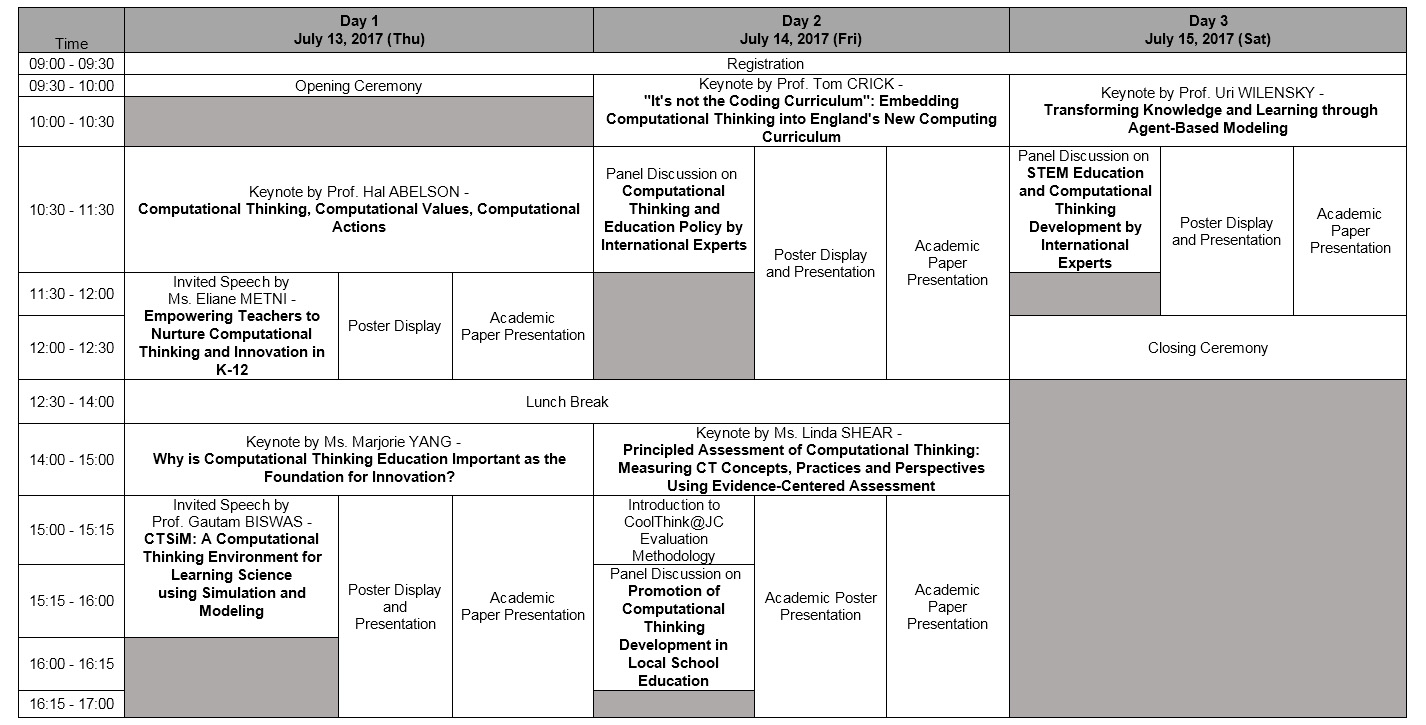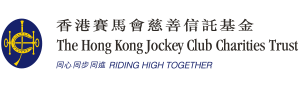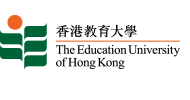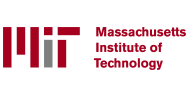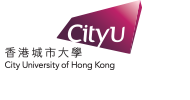Program Agenda
Invited Speeches
Speech Title: CTSiM: A Computational Thinking Environment for Learning Science using Simulation and Modeling
Prof. Gautam BISWAS
Professor
Department of Electrical Engineering and Computer Science
Institute for Software Integrated Systems
Vanderbilt University, The United States
Speech Abstract:
Science education in K-12 classrooms has been a topic of growing importance. In spite of the observed synergies between CT and STEM education, empirical studies have shown that balancing and exploiting the trade-off between the domain-generality of CT and the domain specificity of scientific representations, presents an important educational design challenge. To address this gap in synergistic STEM and CT learning, we have developed a computer-based learning environment called CTSiM: Computational Thinking in Simulation and Modeling for K-12 science learning using a computational thinking approach. CTSiM provides an agent-based, domain-specific, visual programming interface for constructing executable computational models and allows students to execute their models as simulations and compare their models’ behaviors with that of an expert model.
In this talk, I will first present key design principles and their translation to details of the CTSiM architecture through an initial study with 6th-grade students in a middle Tennessee public school. Further, I will also present a framework for developing adaptive scaffolding to help students overcome their difficulties, while learning and building their models of science phenomena in the CTSiM environment.
Speaker Bio:
Prof. Biswas holds a Cornelius Vanderbilt Endowed Chair as Professor of Computer Science and Computer Engineering in the EECS Department and a Senior Research Scientist at the Institute for Software Integrated Systems (ISIS) at Vanderbilt University. He conducts research in Intelligent Systems with primary interests in modeling and simulation, analysis of complex embedded systems, data mining, and computer-based learning environments (CBLEs) for STEM disciplines. A notable project in this area is the Teachable Agents project, where students learn science by building causal models of natural processes. More recently, he has exploited the synergy between computational thinking ideas and STEM learning to develop systems that help students learn their science and math concepts by building simulation models. He has also developed innovative educational data mining and learning analytics techniques for studying students’ learning behaviors and linking them to metacognitive and self-regulated learning strategies. In all of his projects, there has been a strong emphasis on scaffolding students’ learning of metacognitive strategies, and preparing them for future learning. He has published extensively, and has over 500 refereed publications. A research project that developed sophisticated data mining algorithms for aircraft diagnostics and prognostics in conjunction with Honeywell Technical Center and NASA Ames received the NASA 2011 Aeronautics Research Mission Directorate Technology and Innovation Group Award for Vehicle Level Reasoning System using Data Mining methods.
Powerpoint Presentation of Prof. Gautam Biswas
Speech Title: Empowering Teachers to Nurture Computational Thinking and Innovation in K-12
Ms. Eliane METNI
Director
International Education Association, Lebanon (www.iea.org.lb)
Speech Abstract:
While digital learning may contribute to enhancing education and be part of educational transformation, teachers’ role remains crucial in the success of digital initiatives and projects. Research in the field has shown the complex relation between learning and teachers’ usage of digital technologies and a tendency to maintain deeply anchored traditional practices.
Based on over 15 years of experience in blended teacher professional development and design-based research, Eliane lead the development of “Coder-Maker”, a program that builds on innovative pedagogy and the low cost Raspberry Pi technology. The program has the potential to transform pedagogy on a wider scale and invites educators and their students to generate knowledge-building solutions.
Through concrete examples, Eliane will show how the Coder-Maker’s pedagogy has transformed and accelerated students’ learning, and how IEA’s Learn-As-You-Work professional development methodology ties teachers and students in a unique learning experience.
Speaker Bio:
Eliane focuses on building the capacity of educators in formal and non-formal learning, she develops national, regional, and global collaborative programmes. She has co-founded IEA, the International Education Association, and Ennoveo (Education Innovators), she is the Chairperson of the Global Teenager Foundation and the iEARN-Lebanon Coordinator.
In formal learning, she has created a UK accredited school professional development programme that offers qualifications ranging from Level 2 to Level 7. In non-formal education, she has conducted research on Pi4L (Pi for Learning) with UNICEF and developed the Coder-Maker, a design thinking program based on STEAM and physical computing that runs on the Raspberry Pi. She is currently leading a digital learning innovations research in Lebanon and Jordan.
Eliane is currently completing her PhD at the Institute of Education in London focusing on teachers’ professional development and pedagogical innovation.
Powerpoint Presentation of Ms. Eliane Metni
Panel Discussions
Title: Computational Thinking and Education Policy
Facilitator:
Prof. Siu-Cheung KONG, The Education University of Hong Kong, Hong Kong
Panelists:
Prof. Tak-wai CHAN, National Central University, Taiwan
Prof. Tom CRICK, Cardiff Metropolitan University, The United Kingdom
Prof. Siu-Cheung KONG, The Education University of Hong Kong, Hong Kong
Prof. Chee-kit LOOI, Nanyang Technological University, Singapore
Ms. Eliane METNI, International Education Association, Lebanon
Mr. Josh SHELDON, Massachusetts Institute of Technology, The United States
Title: Promotion of Computational Thinking Development in Local School Education
Facilitator:
Principal Tsz-wing CHU, Baptist Rainbow Primary School, Hong Kong
Panelists:
Principal Lap-Wing FUNG, St. Edward's Catholic Primary School, Hong Kong
Principal Chun-Hung LAU, Lok Sin Tong Yu Kan Hing Secondary School, Hong Kong
Principal Kwok-Leung LAU, Chinese YMCA College, Hong Kong
Principal Joyce Fung-Ming SIT, Baptist (STW) Lui Ming Choi Primary School, Hong Kong
Title: STEM Education and Computational Thinking Development
Facilitator:
Dr. Daner SUN, The Education University of Hong Kong, Hong Kong
Panelists:
Prof. Gautam BISWAS, Vanderbilt University, The United States
Prof. Lei FAN, Capital Normal University, People's Republic of China
Prof. Uri WILENSKY, Northwestern University, The United States
Presentation Instruction
Paper Presentation Instruction
- For Full Paper presentation, 30 minutes will be allocated for presentation (including 5 minutes for Q&A). Please keep the presentation within the time limit set.
- For Short Paper presentation, 25 minutes will be allocated for presentation (including 5 minutes for Q&A). Please keep the presentation within the time limit set.
- Please strictly follow the assigned schedule for paper presentation. Please check in your Session Chair before the session in which your presentation begins.
- Standard computer with Windows 7 or above and MS‐Office will be set and connected to a projector in each session room. You can copy your presentation file (MS‐PowerPoint or PDF) to this computer. You can also bring your own computer for presentation.
- Please set up and test your presentation in the designated room prior to your session.
- Please note that electricity in Hong Kong is 220V / 50Hz, UK plug. You are advised to bring power converters or adapters for your own laptop and other electric equipment if necessary.
Poster Presentation Instruction
- The contents of the presentation should be clear and concise. The figures, tables and text on the posters should be large and clear enough that they are readable from a distance. Text in font size less than 1 cm should be avoided.
- The size of the display board will be announced.
- Please include the title of the paper, the names and affiliations of the authors in the poster.
- You should bring your posters to the conference, and mount the posters on the assigned display boards starting from July 13, 2016 (Thursday) morning before the poster presentation from 2:30 pm to 5:00 pm on July 14, 2016 (Friday).
- Please use thumbtacks to mount the posters onto the display boards. Thumbtacks will be available at the presentation site.
- Electricity and Internet connection will NOT be available for the poster presentation.
Proceedings
Copyright by CTE2017 with ISBN
Download the conference proceedings here.
Booth Exhibition
Invitation to Booth Exhibitors
Organizations and companies are invited to submit proposal for Booth Exhibition for CTE2017 to showcase their STEM/coding solutions.
| Exhibition Period: | Jul 13 - 15, 2017 |
| Venue: | Convention Hall, Hong Kong Convention and Exhibition Centre |
| Size per Booth: | 3mW x 2mD x 2.5mH |
| Booth No.: | 16 (If submitted applications exceed the total booth number, selection will be based on the relevance of the proposed exhibitions to computational thinking education framework.) |
| Registration & Deadline: | Please submit proposal here: https://anonmach.ied.edu.hk/machform/view.php?id=2170 before April 28, 2017 |
| Registration Fee: | HK$5,000 (electrical supply, table & chairs, and 13 Amp power socket included) Successful applicants will be notified of the detailed payment method later. |


